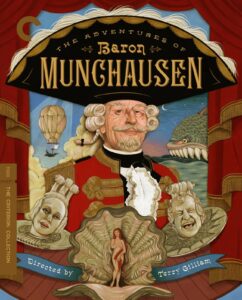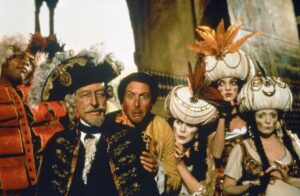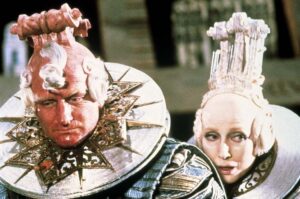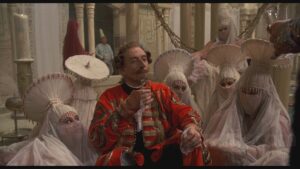Terry Gilliam makes elaborate cult films. He’s not commercial enough to be like Sam Raimi but too commercial to ride on David Lynch’s go-kart. Gilliam loves to puncture all manner of pomposity while, in a way, inflating his own, a truism I believe he himself would cop to. He’s also profoundly perverse in his way of staging operas with one guy and finger puppets while spending $40 mil. on a fart joke. In that sense, he might be born American, but Gilliam’s sensibility is British contrarian, through and through.
 His first major success as a solo director outside of the confines of his Monty Python cohort was Time Bandits (1981), a “children’s film” with a surprisingly dark heart. It was surreal, philosophical, and had deep things to say about the state of poor parenting. It was not a Disney film, that’s for certain.
His first major success as a solo director outside of the confines of his Monty Python cohort was Time Bandits (1981), a “children’s film” with a surprisingly dark heart. It was surreal, philosophical, and had deep things to say about the state of poor parenting. It was not a Disney film, that’s for certain.
After that outing, Gilliam got a reputation for staging the very expensive, very noteworthy dystopian fairy-tale for very adult audiences, Brazil (1985). This earned him the respect of critics but also the ire of studio heads. Such prestige productions were never, ever going to make their money back. Art, shmart – the name of the game is “return on investment,” and Gilliam was a huge risk. His film slated for a 1988 release was going to be another “children’s film.” I’m sure the heads of Columbia (Sony) Pictures at that time were anxious. “Children’s film like Spielberg or children’s film like…Gilliam?”
 The Adventures of Baron Munchausen is the lavish retelling of the “tall tales about the 18th-century German nobleman Baron Munchausen and his wartime exploits against the Ottoman Empire,” as the standard description states. It’s also a celebration of the power of storytelling, even if the lead character is chased by the literal angel of death throughout a portion of the feature. Even if Sting appears in the film for less than a minute and is carted off to be executed, while former Elton John Band member Ray Cooper plays a supporting role throughout. Even if the majestic Jonathan Pryce chews the ravaged scenery with all the glee of a shark biting into a chubby tuna. Long story short: it’s a children’s film like Gilliam, and the international studios associated with the production were wise to worry. The film was a big bomb.
The Adventures of Baron Munchausen is the lavish retelling of the “tall tales about the 18th-century German nobleman Baron Munchausen and his wartime exploits against the Ottoman Empire,” as the standard description states. It’s also a celebration of the power of storytelling, even if the lead character is chased by the literal angel of death throughout a portion of the feature. Even if Sting appears in the film for less than a minute and is carted off to be executed, while former Elton John Band member Ray Cooper plays a supporting role throughout. Even if the majestic Jonathan Pryce chews the ravaged scenery with all the glee of a shark biting into a chubby tuna. Long story short: it’s a children’s film like Gilliam, and the international studios associated with the production were wise to worry. The film was a big bomb.
And yet, this is a massively entertaining film and, dare I say it, a bit softer in its attack than Time Bandits was. The Baron, holed up in a theater under siege, tells his ridiculous stories to relieve the tension that all inside are probably about to die. The Baron is miffed that the company is doing his legend damage, and he decides to set the crooked record straight (or more the other way around) while entertaining the young theater member Sally Salt (future director Sarah Polley) and wooing the other “beautiful ladies” of the cast. With a team including Eric Idle, Winston Dennis, Jack Purvis, and Charles McKeown, everything is ridiculous, absurd, and energetically bonkers.
 But nothing here works if the man at the center of the action drops the ball. John Neville (The Fifth Element, The X-Files) is charming, arrogant, crotchety, and likely a stand-in for Gilliam himself. He passionately believes in every word spilling out of his mouth, even if he knows it is not true. The story becomes the truth in his mind as it enters the world for the first time. He’s a total BS artist…but all filmmakers, all storytellers, and maybe all people are BS artists. We are all the greatest heroes and innocent victims of our personal stories. The question is, are we entertaining even in our wildest delusions? Luckily, Neville’s portrayal is. Sometimes he is genuinely unlikable in this film’s arc. His insanities may get bystanders killed and he does not seem to care. Other times, he’s the general you would gladly go to war behind. It takes a strong actor to make the audience flip back and forth like that without serious fatigue. Everything you see may be Gilliam’s, but without Neville, so much of it is meaningless and unworkable.
But nothing here works if the man at the center of the action drops the ball. John Neville (The Fifth Element, The X-Files) is charming, arrogant, crotchety, and likely a stand-in for Gilliam himself. He passionately believes in every word spilling out of his mouth, even if he knows it is not true. The story becomes the truth in his mind as it enters the world for the first time. He’s a total BS artist…but all filmmakers, all storytellers, and maybe all people are BS artists. We are all the greatest heroes and innocent victims of our personal stories. The question is, are we entertaining even in our wildest delusions? Luckily, Neville’s portrayal is. Sometimes he is genuinely unlikable in this film’s arc. His insanities may get bystanders killed and he does not seem to care. Other times, he’s the general you would gladly go to war behind. It takes a strong actor to make the audience flip back and forth like that without serious fatigue. Everything you see may be Gilliam’s, but without Neville, so much of it is meaningless and unworkable.
 The Criterion Collection is working its way through Terry Gilliam’s filmography, and while I already had the Sony DVD release of it, this upgrade was an easy choice. The Adventures of Baron Munchausen was a poop smear on Sony’s earnings ledger, and its bare bones release on home video reflected the obligatory requirement to put it out. Criterion’s version is terrific looking, even in the grimy, nasty parts of the movie. Fans will want to have this on their shelves, no question.
The Criterion Collection is working its way through Terry Gilliam’s filmography, and while I already had the Sony DVD release of it, this upgrade was an easy choice. The Adventures of Baron Munchausen was a poop smear on Sony’s earnings ledger, and its bare bones release on home video reflected the obligatory requirement to put it out. Criterion’s version is terrific looking, even in the grimy, nasty parts of the movie. Fans will want to have this on their shelves, no question.
In the end, your enjoyment of the movie depends on how you feel about Terry Gilliam’s films overall. If you have no time for his brand of bombast elsewhere, this one isn’t going to miraculously convert you. However, if you are open to a massive adventure with a wicked sense of humor and a veneer of intentionally handmade jank, this film should be up your alley. Disregard the reports of it being a notorious, studio-crushing flop, and just believe The Baron.





Comments